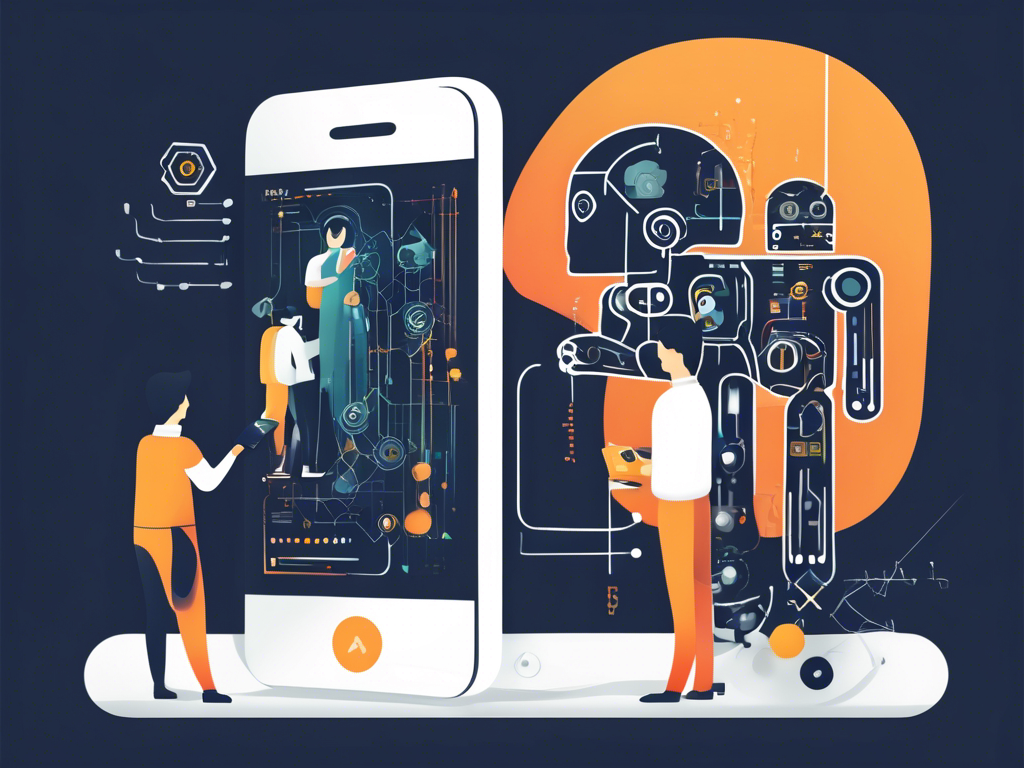In the ever-evolving landscape of technology, Artificial Intelligence (AI) has emerged as a pioneering force, revolutionizing how we interact with our digital world. Among its most groundbreaking frontiers is mobile app development, where AI is reshaping the foundation and future in profound ways. As smartphones become increasingly indispensable, the integration of AI promises to elevate mobile experiences to unprecedented heights.
The Rise of AI in Crafting Personalized User Experiences on mobile apps is a testament to its transformative power. Users now enjoy applications that not only understand their preferences but also anticipate their needs. The advent of AI is also a game-changer in balancing development costs and efficiency, offering developers innovative tools to build apps faster and at reduced expenses.
Moreover, with cyber-threats on the rise, the Role of AI in Enhancing Mobile App Security and Privacy Measures cannot be overstated. AI’s predictive algorithms are setting new standards in protecting user data. And, as we look to the horizon, AI’s Influence on the Future of Mobile App User Interface and User Experience Design promises more intuitive and engaging apps, altering our interaction with mobile devices.
However, the integration of AI into mobile app development comes with its own set of challenges and opportunities. Developers must navigate this complex terrain to harness the full potential of AI.
This article will delve into each of these aspects, exploring how AI is not just an addition to the developer’s toolkit, but a paradigm-shifting force that is redefining mobile app development at its core.
How AI is Changing Mobile App Development

The Rise of AI in Crafting Personalized User Experiences on Mobile Apps
The integration of Artificial Intelligence (AI) into mobile app development has marked a revolutionary shift in how developers create user experiences. Unlike traditional approaches that offer a one-size-fits-all solution, AI enables the construction of highly personalized user experiences, setting a new standard in user engagement and satisfaction. This evolution in mobile app development underscores the importance of understanding and anticipating user needs, thereby enhancing the overall usability and functionality of mobile apps.
Enhancing User Engagement with AI-Powered Personalization
One of the most significant contributions of AI to mobile app development is its ability to analyze vast amounts of data in real-time. By leveraging machine learning algorithms, apps can now predict user behaviors, preferences, and interests with remarkable accuracy. This capability allows for the creation of dynamic, user-specific content and recommendations, dramatically enhancing user engagement. For example, streaming services utilize AI to suggest movies or songs based on past viewing or listening histories, making each user’s experience uniquely tailored to their tastes.
Moreover, AI plays a crucial role in improving the interactivity of apps. Through natural language processing (NLP) and voice recognition technologies, mobile applications have become more intuitive and easier to navigate. Users can now interact with apps using voice commands, significantly reducing the learning curve and providing a smoother, more accessible usage experience. This level of personalization not only boosts user satisfaction but also encourages longer and more frequent interactions with the app.
In conclusion, the rise of AI in mobile app development is transforming the landscape of user experience design. By enabling personalized, intuitive, and engaging interactions, AI is setting a new benchmark for what users expect from their mobile applications. As this technology continues to evolve, we can anticipate even more innovative and user-centric solutions, further solidifying AI’s role in shaping the future of mobile app development.
Navigating the Impact of Artificial Intelligence on Mobile App Development Costs and Efficiency
Reducing Development Costs with AI Automation
The integration of Artificial Intelligence (AI) into the mobile app development process can lead to significant reductions in both time and cost. By automating repetitive and time-consuming tasks, developers are able to focus their efforts on more complex and innovative aspects of app creation. For instance, AI can be used for code generation, bug fixing, and testing processes. This not only speeds up the development cycle but also minimizes human error, ensuring a higher quality product.
Moreover, AI-driven tools and frameworks can adapt and learn from each development cycle, becoming more efficient over time. This continuous improvement in the development process can further reduce costs by decreasing the need for extensive manual testing and troubleshooting. As such, businesses can allocate their resources more effectively, investing in areas that directly enhance user experience and app functionality.
Boosting Efficiency Through Intelligent Algorithms
AI’s capability to process and analyze large volumes of data in real-time transforms how mobile apps are developed and function. Intelligent algorithms can predict user behavior, automate content personalization, and optimize app performance without constant human supervision. This proactive approach to app development and maintenance ensures that mobile applications remain relevant and highly functional, catering to the evolving needs of users.
In addition, AI technologies like machine learning and natural language processing can significantly streamline the development process. For example, predictive algorithms can assist in identifying the most effective design patterns and UI/UX practices, reducing the trial-and-error aspect of development. This not only speeds up the launch of new apps but also enhances the overall user experience by ensuring that apps are built on proven, user-friendly principles from the start.
By harnessing the power of AI, developers and businesses can drastically improve the efficiency of mobile app development. This leads to a faster time to market and an ability to respond quickly to user feedback and market trends. In the long run, leveraging AI in mobile app development is not just a cost-saving measure; it’s a strategic move towards creating more adaptive, intelligent, and user-centric mobile applications.
Exploring the Role of AI in Enhancing Mobile App Security and Privacy Measures

Strengthening Security Through Predictive Threat Analysis
The integration of Artificial Intelligence (AI) into mobile app security represents a significant advancement in protecting user data and privacy. By employing AI-driven predictive threat analysis, apps can now preemptively identify potential security vulnerabilities before they are exploited. This proactive approach to security utilizes machine learning algorithms to analyze patterns and predict malicious activities, effectively blocking them in real-time. For example, an AI system can monitor for unusual login attempts or suspicious transactions, flagging them for further investigation. This not only strengthens the security of mobile apps but also instills a greater sense of trust among users, knowing their data is safeguarded by cutting-edge technology.
Furthermore, AI’s ability to constantly learn and adapt means that mobile app security measures become more robust over time. As new threats emerge, AI systems can update their threat detection models without the need for manual programming. This continuous improvement cycle ensures that mobile apps can defend against the latest cyber threats, offering users a safer and more secure platform.
Enhancing Privacy with Intelligent Data Management
Privacy concerns are at the forefront of modern digital interactions, and AI offers innovative solutions to address these worries within mobile apps. Through intelligent data management, AI can ensure that personal information is handled securely and in compliance with privacy regulations. For instance, AI can automate the process of anonymizing data, stripping out personally identifiable information before it is stored or analyzed. This not only helps in maintaining user privacy but also aids businesses in adhering to stringent data protection standards like GDPR.
Moreover, AI can facilitate the creation of dynamic consent models, where permissions can be adjusted based on the context of user interactions. This tailored approach to data privacy enables a more transparent and user-centric experience, allowing individuals to control what information they share and under what circumstances. By leveraging AI for privacy management, mobile apps can offer a more personalized and respectful user experience, fostering loyalty and trust.
In summary, AI is transforming the landscape of mobile app security and privacy, offering sophisticated solutions to protect user data and enhance trust. By harnessing the power of predictive analytics and intelligent data management, mobile applications can provide a secure and privacy-conscious environment for users, setting a new standard in app development.
AI’s Influence on the Future of Mobile App User Interface and User Experience Design
Revolutionizing UI Design with AI-Powered Tools
The influence of Artificial Intelligence (AI) on user interface (UI) design is profound, creating avenues for more intuitive and engaging mobile applications. AI-powered design tools are revolutionizing the way designers conceptualize and implement user interfaces by offering predictive design suggestions and automating routine tasks. These tools can analyze thousands of design patterns and user interactions to recommend the most effective UI layouts that drive user engagement and satisfaction. For instance, AI can suggest color schemes, typography, and UI elements that are more likely to resonate with the target audience, thereby reducing the guesswork and subjectivity in design decisions.
Furthermore, AI enables the creation of adaptive UIs that can change dynamically based on user preferences and behaviors. This means that the app’s interface can evolve over time to match the users’ needs and preferences, making the user experience deeply personal and significantly more satisfying. By leveraging AI in UI design, developers can create apps that are not only visually appealing but also highly functional and user-centric.
Enhancing UX with Predictive User Behavior Analysis
User experience (UX) design is witnessing a paradigm shift with the integration of AI, particularly through predictive user behavior analysis. This technology allows apps to anticipate user actions and streamline the user journey accordingly, offering a seamless and personalized experience. By analyzing historical data, AI algorithms can predict the future needs and preferences of users, enabling apps to present relevant content and functionality just when the user needs it.
For example, AI can analyze the usage patterns to identify the features most frequently used by an individual and then adapt the app’s navigation or interface to make those features more accessible. This not only enhances usability but also significantly improves user engagement and retention rates. Moreover, predictive analytics can also help in identifying potential UX issues before they become problematic for users, allowing for proactive adjustments.
By harnessing the power of AI in understanding and predicting user behaviors, mobile app developers can create experiences that are not just responsive, but truly anticipatory. This represents a leap forward in how apps are designed, moving from static interfaces to dynamic, user-informed ecosystems that continuously adapt and improve based on user interaction data. The future of mobile app UX design lies in the ability to leverage AI not just as a tool for analysis, but as a cornerstone of a deeply personalized and contextually relevant user experience.
Integrating AI into Mobile App Development: Challenges and Opportunities for Developers

Overcoming the Technical Challenges of AI Integration
The journey to integrate Artificial Intelligence (AI) into mobile app development is fraught with technical challenges, from the complexity of AI models to the need for vast data sets. One of the primary hurdles developers face is the intricate process of designing and training AI algorithms that are both efficient and effective for use in mobile environments. These algorithms must be lightweight enough to operate within the limited processing power and memory capacity of mobile devices, yet powerful enough to deliver the enhanced functionalities that AI promises.
Another significant challenge lies in data collection and management. AI systems require access to large volumes of high-quality data to learn and make accurate predictions. However, ensuring the privacy and security of this data, while adhering to regulations like GDPR, adds another layer of complexity to app development. Furthermore, integrating AI necessitates a strong understanding of machine learning, natural language processing, and other AI-related disciplines—a skill set that is currently in high demand but short supply among developers.
Despite these challenges, the push towards AI integration signals a transformative period in mobile app development, pushing developers to acquire new skills and adapt to the evolving technological landscape.
Unlocking New Opportunities with AI-Enabled Apps
While integrating AI into mobile app development presents significant challenges, it also opens up unparalleled opportunities for developers to innovate and create more intelligent, personalized applications. AI’s ability to process and analyze large volumes of data in real-time allows for the creation of apps that understand and anticipate user needs, providing customized content and interactive experiences that were previously unimaginable.
For instance, AI can empower apps with predictive text and voice recognition features, improving accessibility and usability for users across the board. E-commerce applications can leverage AI to offer personalized shopping experiences, suggesting products based on the user’s browsing and purchasing history, thereby increasing engagement and sales.
Moreover, AI integration facilitates the advancement of smart health applications, capable of monitoring user health data and providing real-time, personalized feedback, advice, and alerts. This not only enhances the user experience but also contributes to better health outcomes.
Lastly, by harnessing the power of AI, developers can significantly reduce manual coding efforts through automated code generation and bug fixing, speeding up the development process and allowing more time for innovation and creativity.
In conclusion, the integration of AI into mobile app development, despite its challenges, holds the promise of revolutionizing the way apps are designed, developed, and used. For developers willing to navigate these hurdles, the rewards include pioneering new frontiers in app functionality, user engagement, and overall satisfaction, marking an exciting era in the evolution of mobile technology.
Summing up
As we have explored, Artificial Intelligence (AI) is not simply an emerging trend in mobile app development; it is a robust catalyst sparking monumental shifts across user experience, development efficiency, security, and design. AI is intricately woven into the fabric of how apps are conceived, developed, and utilised, rendering them more personalized, efficient, and secure.
From personalizing the user experience to innovatively cutting costs and development time, AI’s impact is evident. It is transforming the safety measures of our digital companions, ensuring a fortified wall against privacy intrusions. In the realm of UI/UX design, AI continues to empower designers to create seamless and immersive experiences. Despite these advancements, the challenges developers face in integrating AI are real and significant, yet they present opportunities for growth and innovation.
The broader implications of AI in mobile app development herald a future where our mobile interactions are more empathetic and context-aware. As developers and businesses adapt to AI’s influence, the potential for smarter, more responsive apps that understand and anticipate user needs grows immensely.
Ultimately, the fusion of AI and mobile app development signifies a leap towards a more intelligent and user-centric mobile landscape. It is a clarion call for developers, businesses, and users to embrace the change, pushing the boundaries of what mobile apps can achieve. The journey is underway, and the possibilities are as limitless as the technology driving them.
